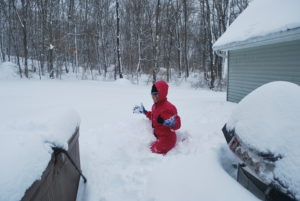Asthma
Asthma is one of the most common respiratory illnesses in the United States, and one common trigger becomes more prevalent in winter: freezing temperatures.
If you have asthma and intend on spending time outdoors in the elements, cover your nose and mouth with a scarf or face warmer to keep from breathing in the cold, dry air. Consider exercising indoors, such as at a gym.
Catching a virus
While the cold weather doesn’t have a direct effect on your chances of contracting a virus, it does force people indoors with centralized heating. The close proximity of many human beings can allow viruses to spread with ease.
According to The National Institutes of Health (NIH), dry winter air allows the flu virus to survive and transmit itself more easily. Also, research suggests that flu virus’ coating becomes tougher at temperatures close to freezing, making them easier to transmit in the winter.
Washing your hands is one of the simplest and most important ways to avoid getting a cold or the flu. Germs are on all surfaces, from door knobs to elevator buttons, and you may be exposing your body to those microbes if you rub your eyes or put your fingers in your nose or mouth without proper hand washing. Also, she recommends to get the flu vaccine. The Centers for Disease Control recommends the flu vaccine for persons six months of age and older.
Weight gain
Exercising daily may already be a struggle, and adding another obstacle in the form of cold and unruly weather can really extinguish your motivation. The numbers on the scale can tend to creep up during reduced exercise isn’t helped by the rich holiday foods and gatherings that involve large meals.
To best combat weight gain, make a conscious effort to get at least 30 minutes of exercise—such as an indoor exercise class to outsmart the elements—at least several times per week. Also, be sure to not binge on the holiday sweets that may be around; leave the cookies for Santa.
Dry skin
Cold weather and low humidity during the winter can dehydrate your skin and leave it looking dull. The Mayo clinic states “Remember to drink at least 64 ounces of water every day to keep your skin supple and to flush out toxins. Health benefits about water is that water is your body’s principal chemical component and makes up about 60 percent of your body weight. Your body depends on water to survive.
Every cell, tissue and organ in your body needs water to work properly. For example, water:
- Gets rid of wastes through urination, perspiration and bowel movements
- Keeps your temperature normal
- Lubricates and cushions joints
- Protects sensitive tissues
Lack of water can lead to dehydration!” This condition can cause many health problems if left untreated.
Also treat your skin gently. Avoid strong soap, shave carefully, use warm water instead of hot water and pat your skin dry rather than rub it dry. Hot water and strong soaps can remove oil that your skin needs to stay healthy.
Seasonal depression
The winter blues can have a real effect on people and can cause some seasonal depression. In fact, the “winter blues” are described as a milder version of seasonal affective disorder (SAD).
To some extent, these mood changes can be attributed to the decreased sunlight and daylight hours. However, for some people, depression can be triggered because of the loss of a loved one during the holidays or the lack of social engagement that can occur because of bad weather.
In order to beat the winter blues, make an effort to get natural sunlight during the day and limit your days spent entirely indoors. Also, be sure that you’re getting proper amount of sleep—about eight hours for most adults.

